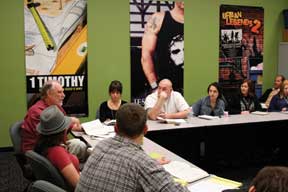
 Larry Osborne, Lead Pastor, North Coast Church, Vista CA
Larry Osborne, Lead Pastor, North Coast Church, Vista CA
Ronald E. Keener
Larry Osborne says he grew up in a rather legalistic church that tended to confuse American values with Biblical values. “Frankly, it turned me off to both God and the church. But by my senior year in high school, through the influence of my parents — who are amazingly godly people without a trace of legalism — and my youth pastor — who is now my Executive Pastor — I came to Christ.
“Not long afterward I sensed his call into pastoral ministry — which shows that God has a rather warped sense of humor and irony,” Osborne says. With his Sticky books — Sticky Church and Sticky Teams, the latter released in April by Zondervan — Osborne shows his own sense of humor and also his common sense about church management, so much so that he is in demand for writing and speaking in addition to his pastoring at North Coast Church, Vista, CA.
What is a “sticky team”?
The tell-tale mark of a sticky team is the ability to stick together during both good and bad times. Lots of ministry teams deal with the good times well. But not so many weather the predictable storms of leadership.
It takes a unique combination of healthy interpersonal relationships and a shared vision of mission in order to stick together for the long haul. If either one is missing, things break down. A lack of healthy relationships turns differences and disagreements toxic. A lack of clarity about mission and priorities produces a mishmash of ministry silos and fiefdoms.
What are some common roadblocks to team unity?
One of the biggest roadblocks to unity is the assumption that it comes naturally. Early in my ministry, I made the mistake of assuming that good and godly people would always get along. I somehow forgot the hard truth of Genesis 3, the unfortunate split between Paul and Barnabas in Acts 16, and the exhortations in Ephesians and elsewhere to diligently pursue unity.
Another huge problem is a sloppy selection process. An awful lot of conflict could be avoided if we just had the courage to guard the gate more carefully. I can’t tell you how many times I’ve asked a pastor under attack if there were any concerns about his nemesis on the front end. The answer is usually, “Yes, but I thought we could work it out.”
The best time to reduce conflict is before it breaks out. The best way to do that is to keep contentious people (and those with an ax to grind or competing ministry vision) off the leadership team. I look at it this way: If I don’t have the guts to guard the gate, I have no right to complain about who’s in the pen.
A third common cause of disunity is the lack of awareness that most leaders and teams have about the impact of growth. A larger church is not just a bigger version of a smaller church. It’s a different animal altogether. The complexities of growth change everything.
This can be especially hard for those who “remember when.” The necessary changes in relationship patterns and structures that growth brings can be quite painful. Imagine how the widows in Acts 6 must have felt when they found out the Apostles would no longer be personally delivering their benevolent funds. It’s a good thing they didn’t talk the apostles into trashing the new deacon process.
Yet that is essentially what many people in our churches want us to do. There are lots of board members, staff members, and folks in the congregation who would prefer to sacrifice the mission rather than change old and comfortable patterns of relationship.
What is the longevity of your team and its ability to stick together over the years?
We’ve been blessed. We’ve had very little turnover over the years. We have quite a few folks with 15 to 20 years of tenure — which is pretty amazing because it was just 22 years ago that I hired our third fulltime staff member.
While that longevity has been a great thing, I believe the key to our health has been our ability to balance these long tenures with fresh blood. We’ve not allowed tenure to become more important than contribution when it comes to who has influence, position, and power.
 In fact, I’ve made a concentrated effort to continually make room for young eagles. At times, I’ve had to ask those who were here first to step back and let someone else take a front seat. That’s seldom been a fun conversation. But when you hire good people who put the mission over their own turf, they’ll get over it. It’s been one of the keys to our long-term health and continued innovation.
In fact, I’ve made a concentrated effort to continually make room for young eagles. At times, I’ve had to ask those who were here first to step back and let someone else take a front seat. That’s seldom been a fun conversation. But when you hire good people who put the mission over their own turf, they’ll get over it. It’s been one of the keys to our long-term health and continued innovation.
What do you mean by “helping young eagles fly”?
I noticed early in my ministry that churches tended to grow out of touch as the leadership team grew older. It was as if they started out on a mission and ended up as a historical preservation society.
It seemed to me that one of the best ways to keep that from happening was to continually make room at the table for what I like to call “young eagles.” These are the next generation of leaders who have the calling, the passion, and the gifts to lead — but perhaps not all the maturity and wisdom we’d like.
I was 28 years old when I became the pastor of North Coast Church. But by the time our leadership team was made up of mostly 40-year-olds, some of us thought that the current crop of 28 year-olds were “too young and immature” for high-level leadership — both on our board and on our staff.
But that was ridiculous. It was a case of the freshman seeming smaller every year. The truth is that our young eagles are more than capable of high level leadership and wise ministry input. Sure, they might see things differently. But that’s a good thing. It’s what young eagles do. They always bring a fresh set of eyes, insights, and new ways of doing things. And the hard truth is: if we won’t let them fly here, they’ll fly elsewhere — often down the street in a fast growing unintentional church plant.
It’s been said that you are known as a mentor to young pastors. Can you name two or three with whom you have been influential in their success?
Well, it strikes me as presumptuous to claim that I’ve been influential in anyone’s success. But I am humbled and honored by how many next generation leaders have said kind words about me and strongly endorsed the insights contained in Sticky Teams. Jesus said something about letting others offer us praise rather than ourselves. So I’ll let the endorsement pages speak for themselves.
What is it that you do in “coming alongside” a young pastor or ministry leader?
The most important thing is to help young pastors and leaders become a better them — not a clone or poor copy of me. I find that too many mature leaders see mentoring as a parent/child relationship. My job is to come alongside, understand an individual’s strengths and weakness, and then help them navigate their unique ministry environment. Fact is, the advice that helps one pastor, can mess up another. So you have to be part cheerleader, part Yoda, part truth-teller.
Isn’t it possible that part of the stickiness is that you are a really nice guy and people just love working with you?
I would like to think so. So would my mother. But anyone who has worked with me would tell you that I’m not the cuddly type. Obviously, to build a sticky team you have to have good people skills. But the skills and principles are not out of reach for most of us. You don’t have to be the life of the party or everybody’s best friend.
Do you subscribe to the view that “there is no I in team”?
Not really. There is a place for strong individualism on a winning team. Strong people come with strong personalities and opinions. But ultimately the team and the mission must come first. I think that’s the clear implication of passages like Philippians 2:3-5 and Matthew 6:33.
I find it interesting that in John’s Gospel he sets the stage for Jesus washing the disciples’ feet by telling us that Jesus knew the Father had put all things under his power; that he had come from God, and that he was returning to God.
It was from that position of emotional and spiritual strength that he took the towel and bowl and washed their feet. It has always seemed to me that the best team players are almost always the most emotionally secure players. It’s as if they have nothing to prove and no one to impress.
When you size up a potential staff member, even a volunteer, what essential qualities do you look for?
I always look for character first. Without it, even the greatest gifts and passion are useless. When someone is fantastic on stage but unloving or ungodly off it, they will eventually do great damage to the ministry and the team.
The second thing I look for is a teachable spirit. I find it to be far more important than great biblical knowledge or spiritual disciplines. A teachable spirit leads to growth. But knowledge and spiritual disciplines (without a teachable spirit) can lead to arrogance — which always tears a team apart — not to mention being a trait that God is not too fond of either.
The third thing I look for is a vision and philosophy of ministry match. There are lots of ways to approach ministry. Many are good. Most can work. But it’s impossible to build a healthy board or staff unless everyone is willing to pull in the same direction.
Do you like this article? Subscribe TODAY to get
Church Executive now available in digital!
The fourth thing I look for is a team player. Playing well in the sand box is incredibly important. Some secular studies have shown it to be one of the primary traits that separate those who succeed and those who are derailed.
A fifth trait would be flexibility. The only one thing I know for sure about the future is that it will be different than I expected. Healthy teams know how to make midcourse corrections. Inflexible people don’t.
The last thing I look for is potential. I’m always more concerned with what someone can become than who they are. I’d rather have a six who will be a 10 someday than a seven who will never be more than a seven.
What qualities are important to avoid?
Two traits stand out at the top of the list. One is the single issue crusader. These folks kill morale because they won’t rest until everyone jumps aboard their favorite bandwagon.
The second is what I call “God-talk.” That’s the person who always has to spiritualize everything. They pepper every conversation with God-talk and spiritual clichés. These people kill vulnerability and authenticity. Plus, they are almost impossible to dialog with in the midst of a substantive disagreement.
A lot of church staffs struggle with conflicting agendas, and with building “silos.” Do you avoid that at North Coast Church?
At North Coast we try to be crystal clear about our mission, our primary strategy and the high value we place on a team-first attitude. You’d have to have record low emotional intelligence to miss those values. But just in case someone does – or forgets – we keep repeating them over and over.
We see our mission as making disciples in a healthy church environment. Our primary strategy is to Velcro people to the Bible and one another through our sermon-based small groups. It’s there that they dig deeper into the weekend sermon and are mobilized to actively love one another and the community around us.
We’ve also identified certain key ministries as core ministries. These are the programs or ministries that must be A+. By clearly articulating what ministries are core and what are ancillary, we undercut much of the confusion and competition for resources that lead to conflicting agendas and ministry silos.
Sometimes I feel like North Coast has been three different churches during my tenure. We’ve never changed the core message, but the packaging has gone through some serious alterations.
 TEAM BUILDING ‘STICKY’ PRINCIPLES
TEAM BUILDING ‘STICKY’ PRINCIPLES
I think that most of our principles are transferable. But if I had to pick out the team building principles that seem to be most transferable to any polity and any size church, I’d pick six:
1. Whenever possible, hire and promote from within. It’s the best way to insure a DNA and vision match.
2. Be as egalitarian as possible. It’s the best way to ensure that you can move people around when.
3. Guard the gate carefully. It’s the best way to avoid future conflict.
4. Make sure your goals and your boundaries are clear. Lots of conflict comes from people who share the same goal but have different visions of how to get there.
5. Avoid micro-management like the plague. It kills morale and creativity.
6. Find a way to bring your young eagles into your inner circle. If you don’t, they will fly elsewhere – and your church will be left to grow old and stale.
— Larry Osborne


